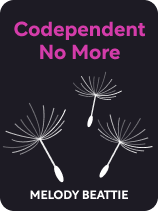

This article is an excerpt from the Shortform book guide to "Codependent No More" by Melody Beattie. Shortform has the world's best summaries and analyses of books you should be reading.
Like this article? Sign up for a free trial here .
What’s so great about the codependency 12 step program? What are the four principles behind the program?
In Codependent No More, Melody Beattie explores codependency and how it affects people’s lives. A self-help classic and the book that inspired codependency 12 Step Programs around the country, Codependent No More provides explanations, advice, and compassion for people struggling with codependency.
Here’s how 12 Step Programs work—and the principles behind the 12 steps to overcoming codependency.
How 12 Step Programs Work
12 Step Programs work well because of three elements: the lack of requirements, the focus on fellowship, and the length of the programs, Beattie explains. The lack of requirements means you can work through the program at your own pace, and if one group isn’t helping you heal, you can find another that suits your needs and personality.
These programs revolve around fellowship, Beattie adds. Everyone in the group is struggling with the same problems of family illnesses and codependency. Honesty is easier when everyone can connect with and understand each other. Members encourage and hold each other accountable, promoting the creation of new habits based on responsibility and self-care.
Finally, Beattie points out that 12 Step Programs don’t have graduations. Family illnesses like alcoholism and codependency are chronic, and the treatment must be as well. Even when you’re “better,” attending meetings provides encouragement, reminds you of how far you’ve come, and allows you to show others that recovery is possible.
| Are 12 Step Programs Really That Great? Beattie claims that 12 Step Programs are almost magical. However, researchers disagree. 12 Step Programs are better than no treatment, but they are no more effective than other treatments like inpatient care or talk therapy. In fact, the very qualities Beattie says make the programs successful can drive people away. While Beattie stresses the importance of being able to go at your own pace, some people benefit from more intensive treatments that focus both on stopping the addiction and treating the underlying traumas that caused the addiction. For these individuals, the slower pace of self-help groups could be detrimental. For some people, fellow program members can actually be a deterrent. This is especially true for minorities, who may feel uncomfortable or unsafe being the only POC/woman/LGBT+ member of the group. Finally, some experts disagree with Beattie’s assertion that chronic conditions like codependency and addiction need chronic treatments. There is no significant difference in recovery between people who remained in the programs for years, people who attended a few meetings, and people who had a brief conversation with their doctors. In addition, continual attendance of the meetings can make some people feel like they’re living for the program, rather than themselves. Thus, the solution to addiction and codependency seems to be simply understanding that recovery is important and desiring to do so, rather than a specific program. |
The Principles of 12 Step Programs
While these programs have 12 steps, we can synthesize these steps into four broad principles.
Principle #1: Accept Your Codependency and Ask for Help
The first principle of the Codependency 12 Step Program is accepting that you have a problem and asking a higher power to help you overcome that problem, Beattie explains. This requires you to accept yourself, give up trying to control your life, and have faith that you can improve with help.
(Shortform note: Naming yourself an addict or a codependent is a big part of 12 Step Programs. These labels represent accepting that you have a problem and need to heal. However, while some people believe the benefits of these labels continue even after getting sober, others argue that labeling yourself is damaging, as it traps you in the identity of an addict or codependent and makes you feel like you can’t recover, even with outside help, which contradicts the main principle.)
Principle #2: Connect to a Higher Power
The second principle involves finding the strength to live a healthy life through a connection to a higher power, Beattie states. The principles don’t dictate a specific higher power, leaving that to the individual. However, they hold that humans are spiritual beings, so the treatment for their illnesses must also be spiritual.
| Do You Need a Higher Power? The spiritual attitude of the 12 Step Programs Beattie advocates for has persisted for decades, but opinions are shifting. There are many people who feel uncomfortable with the spiritual aspects of the programs. This discomfort has led to an increasing number of secular 12 Step Programs, which teach that you can find the strength to live a healthy life through yourself and community, rather than a higher power. Interestingly, some secular groups include spiritual care as an essential part of self-care. They take the same tack as the 12 Step principles, not conflating spirituality with religion, but stressing its importance. They argue that spiritual well-being means connecting with your “inner being” and finding peace through prayer, mediation, and community involvement. |
Principle #3: Make Reparations
The third principle involves admitting the ways you have hurt people and making reparations. Beattie argues that this principle requires paying close attention to yourself, your ideals, and your actions. The goal is to free yourself from guilt, either by making reparations or by releasing unhealthy guilt.
| How to Make Reparations Research agrees with Beattie that making reparations is important to the healing process. Making reparations is a daunting task because it forces you to pay attention to your ideals and the times your actions did not uphold those ideals. Making amends is especially complex for codependents, who have often been hurt by the people they need to make amends to. Here are some tips for making reparations: 1. Talk to the person face-to-face and openly admit to your wrongdoing. Use “I” statements and don’t try to mitigate blame. 2. Ask what you can do to make it up to them. If you have caused a specific kind of damage, such as breaking something, offer to fix or replace the item. Ultimately, though, listen to what the person needs. 3. Give the other person space. Making reparations isn’t about being forgiven or feeling better: It’s about righting your hurtful actions so you can release your guilt. Let the other person process and forgive in their own time, and understand if they can’t. You have fulfilled your responsibility by offering reparations, even if the other person doesn’t want to continue the relationship. 4. Do better in the future. Sometimes the best reparation you can make is learning from your mistakes. |
Principle #4: Share Your Experience
According to Beattie, the final principle of 12 Step Programs is sharing your experience with others. By living a happy and healthy life, rooted in the principles and freed from codependency, you can show others the healing you experienced and encourage them to find that same healing.
(Shortform note: Many people feel that they’re not strong enough to heal. They feel that there is no hope for them. Seeing that you were in the same position and how you healed gives them hope. Sharing your struggles demonstrates that you’re a normal person who put in the work to heal, and they can too.)

———End of Preview———
Like what you just read? Read the rest of the world's best book summary and analysis of Melody Beattie's "Codependent No More" at Shortform .
Here's what you'll find in our full Codependent No More summary :
- What inspired codependency 12 Step Programs around the country
- Explanations, advice, and compassion for people struggling with codependency
- How to practice detachment, self-care, and personal responsibility






